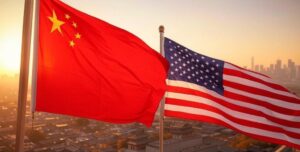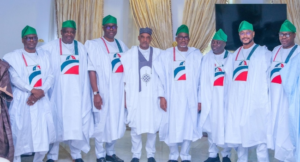
In case you somehow managed not to notice, The Donald got indicted again, this time on the more serious charge of conspiracy to defraud the American public vis-à-vis his claims of a rigged election. Now, I won’t bore you on the specifics of the charges or the various proofs proffered. That undoubtedly will be the most over-reported story of the next 18 months, as both sides of the American political spectrum seek to use Trump’s possible — impending? — incarceration for political gain.
What I find much more interesting than the standard tit-for-tat accusations is that news of his what-is-it-now? third indictment has failed to move the political needle one iota. Again, putting personal politics aside — i.e. regardless of which side of the political divide you’re on — the most interesting statistic I’ve seen is that, according to CNN, Trump continues to lead 93%-1% among those who voted for him in 2020, while Biden still commands 93% versus 3% among his 2020 supporters.
The reason for this impregnable divide, says Lynn Vavreck, John Sides, and Chris Tausanovitch, authors of The Bitter End, about Trump’s 2020 campaign, is that voters are now choosing between political parties based primarily on identity-focused issues. Or, as CNN so blithely points out, “the chasm between the parties has grown so large that very few voters can envision switching sides, even to register a protest over the country’s immediate direction.”
First, let’s go back to 2012. In November of that year, Hyundai and Kia were found to have exaggerated their corporate fleet fuel economy by about one U.S. mpg. They claimed a fleet average of 27 miles for every U.S. gallon. In fact, they only achieved 26 mpg. For those who can only think in metric, the difference was a measly 0.35 L/100 kilometres.
Nonetheless, the protestations were immediate and deafening. Customers complained, the EPA investigated, and the media was unrelenting in its disparagement. Truly, you would have thought babies had been tortured. Eventually, the companies paid a then-incredible US$350 million in penalties, US$255 million in consumer class-action claims, and also had to give up 4.75 million of their much-sought-after carbon credits, which, at the time, the EPA estimated to be worth US$200 million. All told, Hyundai and Kia paid out some US$650 million, all over one measly mile per gallon, an error estimated at the time to have cost customers US$88 if they drove 24,000 kilometres a year.
Fast-forward a decade, and let’s compare that fiasco to the recent revelations about Tesla vehicles’ range estimates, the EV equivalent, I’ll remind you, to an ICE’s fuel consumption. Like the 45th president, Elon Musk’s newest scandal is hardly the first of his tribulations; already under his belt are fires, production delays, and, most recently, numerous concerns over the safety of his car’s self-driving abilities.
Also, like Trump’s latest scolding by special counsel Jack Smith, this latest Tesla-related revelation should be, if history is any judge, the most damaging. According to Reuters, not only has Tesla been deliberately programming its cars to exaggerate their range estimations, it has set up an entire division to deny and obfuscate owners’ accusations that such exaggerations exist. If this were the political arena, the word “obstruction” would be dominating airwaves.
In the first accusation, Reuters quotes an insider in saying Tesla deliberately rigged its cars’ on-board range-estimating software to show “rosy” projections for the distance they could travel on a full battery. Only when the state-of-charge fell below 50 per cent, says Reuters, would the dash readout rein in its enthusiasm and start providing “more realistic projections for their remaining driving range.” In other words, the car was programmed to lie. Most damaging, says the agency’s insider, the directive to create said range inflation came from none other than Mr. Musk himself.
Perhaps more disturbing, however, is that according to, again, Reuters, Tesla set up a “Diversion Team” to “steer customers away from bringing their cars into service whenever possible.” Specifically, the Diversion Team targeted owners who had range complaints, with the team’s sole goal being to discourage people from bringing in their cars to be tested for battery faults because — like the impetus for that Hyundai investigation — their actual mileage didn’t match that which was promised.
The most insulting aspect to Reuters’ story, however, is that according to its source, the office resembled a telemarketing boiler room. One supervisor reportedly even bought a metallophone — that’s some sort of a xylophone with metal keys — used to celebrate employees who managed to cajole an owner into cancelling their appointment to have their car checked for what was, in the end, a very real complaint. Neither Reuters nor the whistleblower may have mentioned it, but I’m pretty sure they were laughing while doing so.
And yet, the Teslarati’s response has been strangely muted. Certainly, there’s been nothing like the hullabaloo that followed Hyundai’s revelations, or the outcry that greeted VW’s Dieselgate. Oh, sure, a class-action suit over the matter has been launched in California (though, if history is, again, any judge, Musk will skate on this one, too). Otherwise, Tesla owners have essentially remained silent in their criticism of their Lord and saviour.
Many Tesla-specific websites have simply ignored it. Or, taking a page right out of the Breitbart playbook, covered it as a “brief” — so they could claim they had “reported” on it — while never actually posting the news piece on their homepage, lest it rankle their audience. And, even when EV sites have legitimately reported Reuters’ revelations, their readers seem – judging by the lack of outraged comments — largely non-plussed. It’s as if — and, yes, I promised you a connection — Trump actually tried to foment an insurrection, and his loyal followers just didn’t give a rat’s you-know-what.
The lack of clamour and commotion amongst Tesla owners certainly doesn’t seem to be for a lack of knowledge. Indeed, one of the most striking similarities between Musk’s Diversions and Volkswagen’s Dieselgate is that it seems everybody knew — or, at least, suspected — that Tesla was fudging its numbers.
For years, reputable sources like Car and Driver and Edmunds have been writing that electric vehicles’ range predictions were inflated, and that Tesla’s were the most — or amongst the most — inflated. Reuters cited Recurrent, a Seattle-based EV analytics company, as yet another source confirming the size of the disparities. Even a study conducted for the Society of Automotive Engineering revealed that Teslas posted the largest discrepancies between EPA estimates and real-world range of all the EVs tested. And, for what it’s worth, my own Range Finder testing found the Model S’ disparity between claimed and real-world range was the worst we ever experienced. In other words, there’s been plenty of coverage detailing Musk’s subterfuge; Tesla owners simply chose to ignore the truth.
In that regard, I will leave you with the revealing words of Electrek, home of Tesla’s most fanatical fan base. In his review of the news — “Tesla vastly overstates its vehicles’ range, report states” — author Seth Weintraub plainly admits that “Tesla’s range estimates [have become] a joke (at least in my family).” Worse yet, he contends the cars themselves already make plain that their range estimations are bogus. Plot a course, says he, to a destination some 300 miles away in your Tesla, and the vehicle, despite claiming to offer 350 miles of range, will more often than not tell you you’ll have to stop at a Supercharger station to get there. As to why this supposedly common knowledge hasn’t previously been front-page news, there’s no indication.
So, bringing this full circle to the lede that I’m sure a few have already condemned as off-topic, I’ll conclude with one piece of advice to Tesla fans: the next time you’re reading about Trump’s latest scandal and can’t understand why his loyal followers can’t see the seemingly obvious lies he’s peddling are plainly for personal gain, try looking in the mirror.








